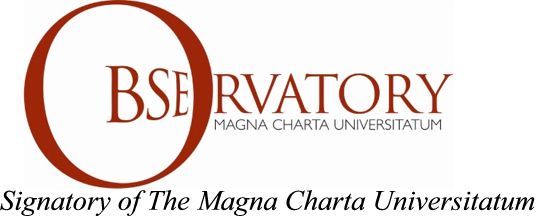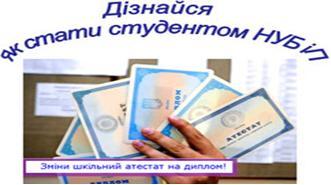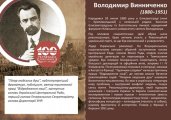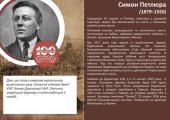History is repeating itself...
History is repeating itself...
18 січня 2020 року
In order to stop the Russian-Soviet offensive on the territory of Ukraine in January 1919, the Government of the Directory of the Ukrainian People's Republic (UNR) headed by V. Vynnychenko sent an official diplomatic mission to Moscow to negotiate with the Kremlin's heads.
During the talks, the Russian side did not recognize the proposal of the Ukrainian delegation to end hostilities between the RSFSR (Russian Socialist Federal Soviet Republic) and the UNR. Representative of the Council of People's Commissars of Russia G. Chicherin persuaded the Ukrainian side that the RSFSR government does not interfere with the internal affairs of Ukraine. And the war that is taking place in Ukraine is a civil war between the supporters of the USSR (Ukrainian Socialist Soviet Republic) on the one hand and the troops of the UNR Directory on the other. At the same time, the Russian side did not hide its sympathy for the armed forces from the Ukrainian SSR in eastern Ukraine, which were fighting against the UNR.

Georgiy Chicherin
The representative of the Council of People's Commissars of Russia D. Manuilskiy proposed to the Ukrainian delegation a draft agreement, which consisted of three points:
I) the UNR and the RSFSR enter into a pact on a joint military battle against the Entente troop in southern Ukraine, detachments of Ataman P. Krasnov and A. Denikin's troops;
2) in order to achieve good neighborly relations between the two countries, rebuild consular services and trade, the UPR Directory agrees that the dictatorship of the proletariat would become the leading ideology in Ukraine and the fate of the authorities in Ukraine be decided by the Congress of Soviets;
3) members of the Ukrainian delegation raised a petition before the UNR government for the release of the Konotop communists arrested by the leaders of the Ukrainian army. Otherwise, the Kremlin's leaders threatened to crack down on all Ukrainians in Soviet Russia.
The only thing the Ukrainian diplomats agreed on was to maintain neutrality over such forces as the Cossack army of Ataman P. Krasnov and A. Denikin Volunteer Army. At the talks, Ukrainians were forced to admit that the actions of A. Denikin's army posed a danger to Ukraine. At the same time, UNR diplomats assured that the Entente landing in southern Ukraine was not threatening anyone. Regarding the decision of the authorities in Ukraine by the Congress of Soviets, as the Kremlin leaders wanted, the arguments of the Ukrainian side came down to the fact that the form of government in Ukraine is being worked out by the Labor Congress. The dictatorship of the proletariat cannot be mentioned, either, since Ukraine is an agrarian state, and a small percentage of workers are made up mainly of emigrant elements, that is, ethnic Russians. "Establishing the power of the dictatorship of the proletariat," – said the head of the Ukrainian delegation S. Mazurenko, "would threaten suicide for an independent Ukraine."
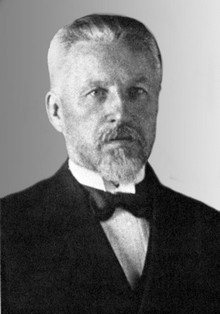
Semen Mazurenko
The Ukrainian side also refused to comply with paragraph 3 of the draft agreement, which referred to resolving the fate of the Konotop Communists. The threat of the Soviet-Russian side to repress all Ukrainians who were at that time in the territory of Soviet Russia was uneffected, either. It should be noted that during the red terror in Russia, repressions did not pass by Ukrainian citizens. According to the Ukrainian consul from Moscow, "according to the statements made, the consulate lists 363 arrested Ukrainian citizens ... Out of 363, the consulate released 60, 20 were shot."
When it became known to S. Mazurenko from the Moscow newspapers that the Russian-Soviet army was already near Kyiv, he categorically stated, that “with the communist occupation of Kyiv and the repetition of the “muravyovshchyna”, all our work must be canceled and the Ukrainian delegation should relinquish its powers. Without a previous peace treaty, it is impossible to negotiate peace."
Finally, the parties came to this understanding: the UNR Directory recognizes the principle of power of councils in Ukraine, and the RSFSR provides neutrality of Ukraine with active protection against foreign interference. A ceasefire was established between the armed forces in eastern Ukraine and the UNR during the peace talks brokered by the Kremlin leaders and a joint struggle between the RSFSR and the UPR against the counter-revolution was proclaimed.
Thus, at the Moscow talks, S. Mazurenko achieved the recognition of the UNR Directory by Soviet Russia before the opening of the Congress of Soviets and the armistice at the fronts until the time of the final ratification of the agreement and at the time of the negotiations. However, the agreement recognized the power of the Soviets in Ukraine. This, in turn, meant only one thing – without armed resistance, the authorities in the UNR – soon had to move legally to the Communist Party of Ukraine, a branch of the Russian Communist Party.
Upon the arrival of Ukrainian diplomats at the State Center in Vinnytsia, since Kyiv had already been taken over by Russian-Soviet troops, V. Vynnychenko was indignant at accepting the terms of the above agreement with Soviet Russia and resigned. The head of the UNR Directory was S. Petliura, a supporter of the pro-Western foreign policy vector.
Thus ended the attempt of the UPR Directory directors to halt diplomatically the second wave of Russian-Soviet aggression against Ukraine. Can the activities of Ukrainian diplomats in the negotiations in Moscow be called a defeat? No! After all, the famous saying "when diplomats are silenced, guns start talking" is quite relevant today. And we know it well!
Serhiy Varhatiuk,
Associate Professor of the Department of International Relations
and social sciences



